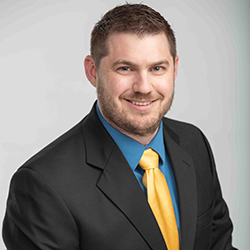Dr. Ian Crain’s Wonder Led Him to Neurology
Ian Crain, MD, was born in San Francisco, California, but his father’s job as a dentist in the U.S. Public Health Service led his family to move around for a few years.
From Montana to North Dakota, the Crain family eventually moved to Phoenix, Arizona, right before Dr. Crain’s seventh birthday. Dr. Crain grew up in Phoenix and attended Arizona State University (ASU) for his undergraduate studies.
“I decided to pursue medical school during the second half of undergrad at ASU,” Dr. Crain said. “Growing up in rural places, I thought the dream was too big for me, but I decided to pursue it and apply.”
While his mother’s career as a school psychologist sparked his interest in psychology, Dr. Crain’s inspiration to pursue medicine stemmed from his father’s career in dentistry and serving the community.

“I wanted to be somebody who was helpful or useful to my community,” Dr. Crain said. “My father liked his job, and he felt appreciated, so I believe that helped me get interested in the health care field from a young age.”
After applying for medical school and facing rejection the first time, Dr. Crain said that he felt encouraged to try again the following year after gaining some more experience.
“I knew there were spots in my application that were not as strong as they could have been,” Dr. Crain said. “I filled those gaps in and applied again.”
Dr. Crain applied for medical school a second time and matriculated to the University of Arizona College of Medicine – Phoenix’s second class.
From his time at medical school, Dr. Crain praises the college’s professors, resources and rotations for allowing him to explore his interests before graduation.
“I decided that I wanted to do the Rural Health Professions Program because that’s something that I grew up with,” Dr. Crain said. “It was nice to have different types of experiences available.”
After graduating from medical school in 2012, Dr. Crain completed a neurology residency at St. Joseph’s Hospital and Medical Center in Phoenix followed by a fellowship in sports neurology at the same hospital.
Dr. Crain serves as director of Banner Health’s Brain Injury Center. He specializes in neurology at Banner – University Medical Center Phoenix and serves as an associate clinical professor in the U of A College of Medicine – Phoenix’s Department of Neurology.
“Banner seemed like the best fit for me because they had a good concussion center that focused specifically on athletes, and the neurology department was growing,” Dr. Crain said. “Working with residents at the clinic is probably the most rewarding part of what I do now.
Dr. Crain focuses on helping those who have experienced trauma or acquired brain injury lead full lives.
Some of the biggest changes that Dr. Crain has seen in neurology have been the rise in telemedicine use since the pandemic and gene therapy being used to cure ailments.
“A lot of drugs that didn’t exist when I was in training are now out, and it’s changed the entire outlook of these medical conditions,” Dr. Crain said. “I think we’re on this cusp of exciting discoveries in other areas in neurology.”
Dr. Crain advises medical students to pay attention to what they learn because one day it will be needed in a real-world practice.
He also shared some words of wisdom on creating a career in the medical field and methods to prevent burnout.
“You have to decide for yourself what you’re going to do with the rest of your life, and there’s a wide range of options,” Dr. Crain said. “To prevent burnout, you want to be involved and the best way is to forge out the path that you want to be on by doing things that you want to do.”
About the College
Founded in 2007, the University of Arizona College of Medicine – Phoenix inspires and trains exemplary physicians, scientists and leaders to advance its core missions in education, research, clinical care and service to communities across Arizona. The college’s strength lies in our collaborations and partnerships with clinical affiliates, community organizations and industry sponsors. With our primary affiliate, Banner Health, we are recognized as the premier academic medical center in Phoenix. As an anchor institution of the Phoenix Bioscience Core, the college is home to signature research programs in neurosciences, cardiopulmonary diseases, immunology, informatics and metabolism. These focus areas uniquely position us to drive biomedical research and bolster economic development in the region.
As an urban institution with strong roots in rural and tribal health, the college has graduated more than 1,000 physicians and matriculates 130 students each year. Greater than 60% of matriculating students are from Arizona and many continue training at our GME sponsored residency programs, ultimately pursuing local academic and community-based opportunities. While our traditional four-year program continues to thrive, we will launch our recently approved accelerated three-year medical student curriculum with exclusive focus on primary care. This program is designed to further enhance workforce retention needs across Arizona.
The college has embarked on our strategic plan for 2025 to 2030. Learn more.